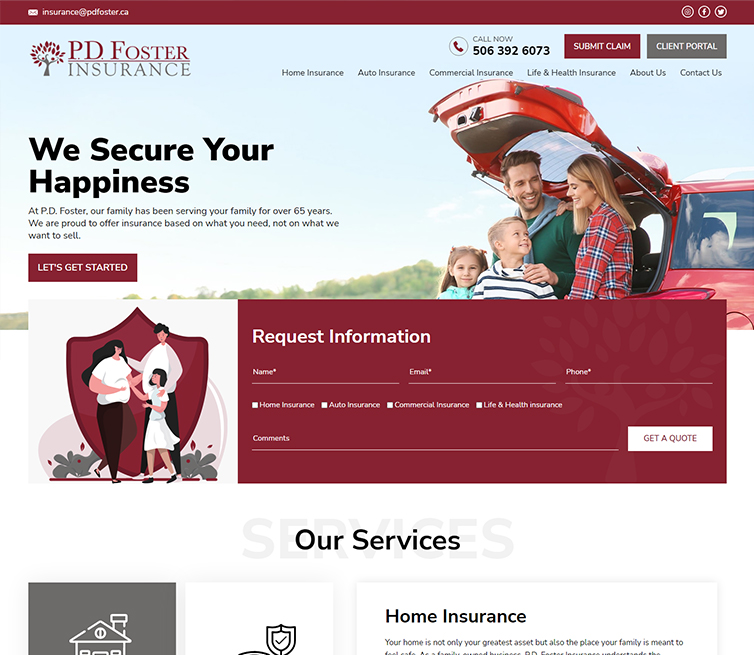Opening your home to a foster child is a noble act of compassion, but it also comes with unique challenges and potential risks. Foster insurance serves as a safety net, providing financial protection and peace of mind for both foster families and the children they care for.
This comprehensive guide explores the intricacies of foster insurance, delving into its purpose, types, benefits, and the application process. We’ll also examine key features of policies, address cost considerations, and navigate the claims process. By understanding the nuances of foster insurance, families can make informed decisions and ensure they have the right coverage to safeguard their well-being.
Understanding Foster Insurance
Foster insurance is a type of coverage designed to protect foster parents and the children in their care. It provides financial protection against potential risks and liabilities associated with fostering.
Foster insurance is crucial for safeguarding both the well-being of foster children and the financial stability of foster families.
Types of Foster Insurance
There are various types of foster insurance available, each addressing specific needs and concerns.
- Liability Insurance: This type of insurance protects foster parents against legal claims arising from injuries or damages caused by the foster child. It covers expenses related to legal defense, settlements, and judgments.
- Medical Insurance: Provides coverage for medical expenses incurred by the foster child, including doctor visits, hospital stays, and prescription medications. This ensures that foster children have access to necessary medical care.
- Property Insurance: Protects foster parents against damage or loss to their property caused by the foster child. This coverage is particularly important for foster families who have valuable belongings or live in areas prone to natural disasters.
- Personal Injury Protection (PIP): This insurance covers medical expenses and lost wages for foster parents if they are injured in an accident involving a foster child. PIP is typically included in auto insurance policies but can be purchased separately.
Situations Where Foster Insurance is Essential
Foster insurance is particularly essential in various situations where foster parents face potential risks.
- Accidents: If a foster child is injured in an accident on the foster parent’s property or while under their supervision, liability insurance can cover legal expenses and settlements. For instance, if a child falls and breaks a leg while playing in the backyard, the foster parent’s liability insurance would help cover medical bills and potential legal claims.
- Property Damage: Foster children may accidentally damage the foster parent’s property, such as breaking a window or spilling paint on the carpet. Property insurance would help cover the cost of repairs or replacements.
- Legal Claims: Foster parents may face legal claims from the foster child or their biological family, alleging negligence or abuse. Liability insurance provides legal defense and financial protection against such claims.
- Medical Emergencies: Foster children may experience medical emergencies requiring immediate and expensive treatment. Medical insurance ensures that they receive necessary care without putting a financial strain on the foster family.
Benefits of Foster Insurance
Foster insurance offers a range of benefits that provide financial protection, peace of mind, and legal and ethical support for foster families. It acts as a safety net, safeguarding families from unexpected financial burdens and ensuring the well-being of the children in their care.
Financial Protection
Foster insurance provides a crucial layer of financial protection for foster families. It covers a wide range of expenses related to the care of foster children, including medical costs, legal fees, and property damage.
- Medical Expenses: Foster insurance covers medical costs associated with accidents, illnesses, and pre-existing conditions of foster children. This includes hospital stays, surgeries, medications, and rehabilitation services.
- Legal Fees: Foster insurance can help cover legal fees incurred in cases of negligence or liability related to the care of foster children. This can include expenses for legal representation, court fees, and settlements.
- Property Damage: Foster insurance protects foster families from financial losses due to property damage caused by foster children. This can include damage to furniture, appliances, or the home itself.
Key Features of Foster Insurance Policies
Foster insurance policies offer various coverage options, designed to protect foster parents and the children in their care. Understanding these features is crucial for choosing the right policy and ensuring adequate protection.
Coverage Options
Foster insurance policies offer a range of coverage options, tailored to the specific needs of foster parents and the children in their care. These options can include:
- Liability Coverage: This covers legal expenses and damages if a foster child is injured or causes damage to another person’s property.
- Medical Payments Coverage: This covers medical expenses for foster children, regardless of who is at fault, up to a specified limit.
- Personal Injury Protection (PIP): This covers medical expenses and lost wages for foster parents in the event of an accident involving a foster child.
- Property Coverage: This covers damage to the foster parent’s property caused by a foster child.
- Child Care Coverage: This covers expenses for childcare if the foster parent is unable to care for the child due to an accident or illness.
Exclusions and Limitations
Foster insurance policies typically have certain exclusions and limitations. These may include:
- Pre-existing Conditions: Some policies may exclude coverage for medical expenses related to pre-existing conditions of the foster child.
- Intentional Acts: Coverage may not apply to injuries or damages caused by the intentional acts of the foster child.
- Certain Activities: Policies may exclude coverage for certain activities, such as participation in dangerous sports or driving without a license.
- Specific Types of Foster Care: Some policies may not cover certain types of foster care, such as kinship care or emergency placements.
Essential Elements of a Comprehensive Foster Insurance Plan
A comprehensive foster insurance plan should include the following elements:
- Adequate Liability Coverage: This is essential to protect foster parents from financial losses in the event of a lawsuit.
- Sufficient Medical Payments Coverage: This ensures that foster children receive necessary medical care without financial strain.
- Appropriate Property Coverage: This protects foster parents from financial losses due to damage to their property caused by foster children.
- Child Care Coverage: This provides peace of mind for foster parents, knowing that they have financial support if they are unable to care for the child.
The Application Process
Applying for foster insurance involves several steps and considerations to ensure you secure the most suitable policy for your needs. This process typically includes gathering information, comparing quotes, and submitting documentation.
Obtaining Competitive Quotes
Finding the best foster insurance policy involves comparing quotes from different insurers. To obtain competitive quotes, you should:
- Use online comparison tools: Many websites allow you to enter your details and receive quotes from multiple insurers simultaneously, simplifying the comparison process.
- Contact insurers directly: Reach out to insurance companies directly to discuss your specific needs and obtain personalized quotes.
- Ask for discounts: Inquire about potential discounts, such as those for bundling multiple insurance policies or for having a good driving record.
Required Documentation
When applying for foster insurance, you will need to provide certain documentation to verify your information and eligibility. This typically includes:
- Proof of identity: This may include a driver’s license, passport, or other government-issued identification.
- Proof of address: This may include a utility bill, bank statement, or lease agreement.
- Vehicle information: You will need to provide details about the vehicle you wish to insure, such as the make, model, year, and VIN.
- Driving history: You will need to provide your driving history, including any accidents or violations.
- Prior insurance information: If you have previously had foster insurance, you may need to provide details about your previous policy.
Submitting Your Application
Once you have gathered the necessary documentation, you can submit your application. You can typically do this online, by phone, or in person. When submitting your application, ensure all information is accurate and complete.
Reviewing and Approving Your Application
After submitting your application, the insurance company will review it and make a decision on whether to approve it. This process may take a few days or weeks, depending on the insurer and the complexity of your application. If your application is approved, you will receive a policy document outlining the terms and conditions of your coverage.
Cost and Affordability

Foster insurance, like any other type of insurance, comes with a price tag. Understanding the factors that influence its cost is crucial for making informed decisions and finding the most affordable option.
Factors Influencing Cost
The cost of foster insurance is influenced by a variety of factors, including:
- The age and health of the foster child: Younger children generally have lower insurance premiums than older children, as they are less likely to require extensive medical care. Similarly, children with pre-existing medical conditions may have higher premiums.
- The type of foster care: Different types of foster care, such as traditional foster care, kinship care, or specialized care for children with specific needs, may have varying insurance costs.
- The coverage level: Foster insurance policies come with different coverage levels, ranging from basic coverage to more comprehensive plans. Higher coverage levels generally come with higher premiums.
- The insurance provider: Different insurance companies have different pricing structures and may offer varying premiums for similar coverage levels.
- The state or region: The cost of foster insurance can vary depending on the state or region where the foster family resides, due to factors like local medical costs and regulations.
Average Cost Comparison
The following table provides a general comparison of average costs for different types of foster insurance policies:
| Policy Type | Average Monthly Premium |
|---|---|
| Basic Foster Care Insurance | $50 – $100 |
| Comprehensive Foster Care Insurance | $100 – $200 |
| Specialized Foster Care Insurance | $200+ |
Note: These are just average costs, and actual premiums may vary depending on the factors mentioned above.
Finding Affordable Options
Finding affordable foster insurance options requires careful research and comparison. Here are some strategies:
- Compare quotes from multiple insurance providers: This allows you to see the range of premiums available for similar coverage levels.
- Explore state-specific programs: Some states offer subsidies or programs that can help reduce the cost of foster insurance.
- Consider a basic plan: If your budget is tight, a basic plan with essential coverage may be sufficient.
- Look for discounts: Some insurance providers offer discounts for foster families, such as multi-child discounts or discounts for families with good driving records.
Claims Process and Support
Foster Insurance understands that navigating a claim can be a stressful experience, especially when dealing with the complexities of foster care. We’ve designed our claims process to be straightforward and supportive, ensuring a smooth and timely resolution for our policyholders.
Filing a Claim
To initiate a claim, foster families are encouraged to contact our dedicated claims team directly. They can be reached via phone, email, or through our online portal. The team will guide families through the necessary steps, gathering essential information to assess the claim and initiate the appropriate procedures.
- Claim Form: Families will be provided with a comprehensive claim form to complete, outlining the details of the incident, the nature of the claim, and any supporting documentation. This form ensures all necessary information is collected for a thorough review.
- Supporting Documentation: Foster families are encouraged to gather relevant supporting documentation, such as medical bills, police reports, or incident reports, to facilitate the claim review process. This documentation helps provide a clear understanding of the situation and assists in expediting the claim resolution.
- Review and Assessment: Once the claim form and supporting documentation are received, our team will carefully review the information, assessing the claim against the policy terms and conditions. This review ensures that the claim meets the coverage criteria and determines the extent of the benefits payable.
Support Services
We recognize that navigating a claim can be challenging for foster families. Our dedicated team provides comprehensive support throughout the process, ensuring families feel informed and guided.
- Claims Representatives: Our experienced claims representatives are available to answer questions, provide guidance, and address concerns. They act as a point of contact, keeping families updated on the status of their claim and providing timely updates.
- Resource Network: We have a network of trusted professionals, including legal experts, financial advisors, and social workers, who can provide additional support and resources to foster families facing complex situations. This network ensures that families have access to the necessary expertise and guidance during challenging times.
- Case Management: In situations requiring more complex assistance, our team will assign a dedicated case manager to oversee the claim. Case managers act as advocates for families, ensuring their needs are met and providing personalized support throughout the process.
Successful Claim Resolutions
Foster Insurance has a proven track record of resolving claims efficiently and fairly, ensuring families receive the support they need.
“We were so relieved to have Foster Insurance by our side when our foster child needed emergency medical care. The claims process was seamless, and we were able to focus on our child’s recovery knowing that we had the financial support we needed.” – Jane, a Foster Parent
Our commitment to providing exceptional customer service and efficient claim resolution has earned us a reputation for reliability and responsiveness.
Legal Considerations

Navigating the legal landscape of foster insurance is crucial for both foster families and insurance providers. Understanding the regulations and rights involved ensures a smooth and compliant process.
Regulatory Framework
Foster insurance operates within a complex legal framework, encompassing federal and state regulations. The federal government sets minimum standards for foster care, including insurance requirements. State laws often go beyond these minimums, adding their own regulations and mandates. For instance, some states require specific coverage types, like liability insurance, while others specify minimum coverage amounts. It’s essential for foster families and insurance providers to be aware of the specific legal requirements in their respective states.
Rights and Responsibilities
Foster families have specific rights and responsibilities concerning insurance. They are entitled to receive information about the insurance coverage provided, including policy details and claim procedures. They also have the right to choose their own insurance provider, subject to the state’s regulations and foster care agency’s requirements. Foster families are responsible for adhering to the terms of the insurance policy and ensuring that all necessary information is provided for claim processing.
Potential Legal Issues
While foster insurance is designed to protect both foster families and children, legal issues can arise. Disputes regarding coverage, claim denials, and liability claims are potential areas of concern. For example, a foster family may face a legal challenge if a child sustains an injury while in their care, and the insurance company denies coverage due to policy exclusions or a claim of negligence. In such cases, legal representation and understanding of relevant laws are crucial to protect the interests of all parties involved.
Foster Insurance for Different Situations

Foster insurance is designed to protect foster parents and the children in their care from a variety of risks. The specific needs of foster insurance will vary depending on the individual situation.
Insurance Needs for Various Foster Care Scenarios
Understanding the unique needs of different foster care scenarios is crucial for selecting the right insurance coverage. This table Artikels the key insurance considerations for various foster care situations:
| Foster Care Scenario | Key Insurance Needs |
|—|—|
| Short-Term Foster Care | – Liability coverage for injuries or property damage caused by the child in care.
– Medical coverage for the child’s unexpected health issues.
– Accidental death and dismemberment coverage for the child. |
| Long-Term Foster Care | – Comprehensive liability coverage for potential legal issues.
– Medical coverage for chronic health conditions or special needs.
– Coverage for educational expenses and therapy. |
| Foster Care of Children with Special Needs | – Expanded medical coverage for specialized care.
– Liability coverage for potential risks associated with special needs.
– Coverage for specialized equipment or therapies. |
| Foster Care of Teenagers | – Liability coverage for potential legal issues related to teenage behavior.
– Coverage for property damage caused by teenagers.
– Coverage for mental health services. |
| Foster Care of Siblings | – Coverage for the unique needs of multiple children in care.
– Liability coverage for potential sibling conflicts.
– Medical coverage for potential health issues affecting multiple children. |
Examples of Foster Insurance Addressing Unique Situations
Foster insurance can provide vital protection for foster parents and the children in their care, even in complex situations. Here are some examples:
* Medical Coverage for Unexpected Health Issues: A foster parent caring for a child who develops a sudden illness or injury would have access to medical coverage through their foster insurance policy. This can alleviate financial strain and ensure the child receives necessary medical attention.
* Liability Coverage for Property Damage: If a foster child accidentally damages property belonging to the foster parents or others, liability coverage can help cover the cost of repairs.
* Coverage for Educational Expenses: Foster insurance can help cover educational expenses for foster children, such as tuition, books, and supplies, ensuring they have access to quality education.
* Coverage for Mental Health Services: Foster children may require mental health support due to past trauma or challenges. Foster insurance can help cover the cost of therapy and counseling, promoting their emotional well-being.
Benefits of Specialized Foster Insurance Plans
Specialized foster insurance plans offer several advantages over standard homeowner’s or renter’s insurance:
* Comprehensive Coverage: Foster insurance policies are designed to address the specific risks associated with foster care, offering broader coverage than traditional insurance.
* Tailored Coverage: Foster insurance plans can be customized to meet the unique needs of each foster family, including the age, health, and special needs of the children in their care.
* Financial Protection: Foster insurance provides financial protection for foster parents, helping them manage potential costs associated with caring for foster children.
* Peace of Mind: Knowing that they have adequate insurance coverage can provide foster parents with peace of mind, allowing them to focus on providing a safe and loving environment for the children in their care.
Resources and Additional Information
Finding the right foster insurance can be a crucial step in ensuring financial security and peace of mind for foster families. To assist you in your search, we’ve compiled a list of reputable providers and organizations, as well as relevant resources to help you make informed decisions.
Reputable Foster Insurance Providers and Organizations
To find a suitable provider, consider these organizations known for their expertise in foster care insurance:
- The National Foster Parent Association (NFPA): The NFPA offers a variety of resources for foster parents, including information on insurance options.
- The Dave Thomas Foundation for Adoption: This organization provides support and resources for foster families, including information on insurance.
- The Foster Care Review Board: This board oversees foster care systems and can provide information on insurance requirements.
Relevant Articles, Websites, and Publications
Explore these valuable resources for further insights into foster insurance:
- “Foster Care Insurance: A Guide for Parents” by the National Foster Parent Association: This comprehensive guide provides a detailed overview of foster care insurance, including types of coverage and important considerations.
- “Understanding Foster Care Insurance” by the Dave Thomas Foundation for Adoption: This article explains the basics of foster care insurance and highlights key features to look for.
- “The Importance of Foster Care Insurance” by the Foster Care Review Board: This publication emphasizes the crucial role of insurance in protecting foster families and children.
Seeking Professional Advice and Support
Consulting with experts can be beneficial in navigating the complexities of foster insurance:
- Foster Care Agencies: Many foster care agencies have staff members who can provide guidance on insurance options and help you find suitable providers.
- Insurance Brokers: Specialized insurance brokers can assist you in comparing different policies and finding the best coverage for your needs.
- Financial Advisors: Financial advisors can offer expert advice on financial planning for foster families, including insurance considerations.
Wrap-Up

Foster insurance is more than just a policy; it’s a commitment to providing a secure and stable environment for foster children. By understanding the different types of coverage, comparing providers, and navigating the application process, families can confidently navigate the unique challenges of fostering and focus on nurturing the children in their care.

